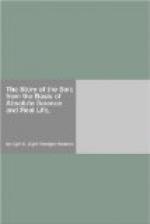“That is surely the way it would work out in practical farming,” said Mr. West. “I think I did not tell that $4.80 a ton is the lowest quotation I have been able to get as yet for ground limestone delivered at Blue Mound Station.”
“That would make its use prohibitive,” said Percy. “You ought to get it for just one-fourth of that, or for $1.20 a ton. In Illinois we can get it delivered a hundred miles from the quarry for $1.20 a ton. It costs no more for a thirty-ton car of ground limestone than the farmer receives for a cow; and the cost of a car of fine-ground natural phosphate is about equal to the price of one horse.”
“Of course, our limestone supplies are essentially inexhaustible,” said Mr. West, “but is that also true of our natural phosphate deposits?”
“It is not true of the high-grade phosphate,” replied Percy; “for, according to the information furnished by the United States Geological Survey, it is evident that the known supplies of our high-grade phosphate will be practically exhausted in fifty years if our exportation continues to increase at the prevailing rate. After that is gone we may then draw upon our low-grade phosphate deposits, which though probably not inexhaustible are known to be exceedingly extensive.”
CHAPTER XXXI
THEORIES VERSUS FACTS
Percy planned to walk to Blue Mound to take the three-thirty train that Saturday afternoon; but Adelaide’s parents both insisted that she would willingly drive to the station, and the grandmother discovered that she needed a certain kind of thread which Adelaide could then also get at the store.
“Certainly,” said Adelaide, with some merriment, “I always enjoy our departing guests to the train.”
“Very well,” replied Percy. “If you must go to get the thread and will permit me to be the coachman, I shall be satisfied, for you will be home early.”
“Then we will take the colts and buckboard, and I shall be home in less than twenty minutes after your train leaves the station.”
“I think I have missed several days of your beautiful ’Indian Summer,’ because of my trip to the North,” Percy remarked to Mr. West as they sat on the broad veranda waiting for the hour of two thirty when the colts were to be ready for the drive.
“I wish you might have been with us while Professor Barstow was here,” replied Mr. West, “not only because of the mild autumn weather we have had, but also because Professor Barstow has some ideas about questions of soil fertility that are very different from those you hold. He says a young man from Washington gave a lecture at his college down in North Carolina, in which he informed them that the cause of infertility of soils is a poisonous substance excreted by the plant itself, and that this can be overcome by changing from one crop to another because the excrete of one plant, while poisonous to that plant, will




